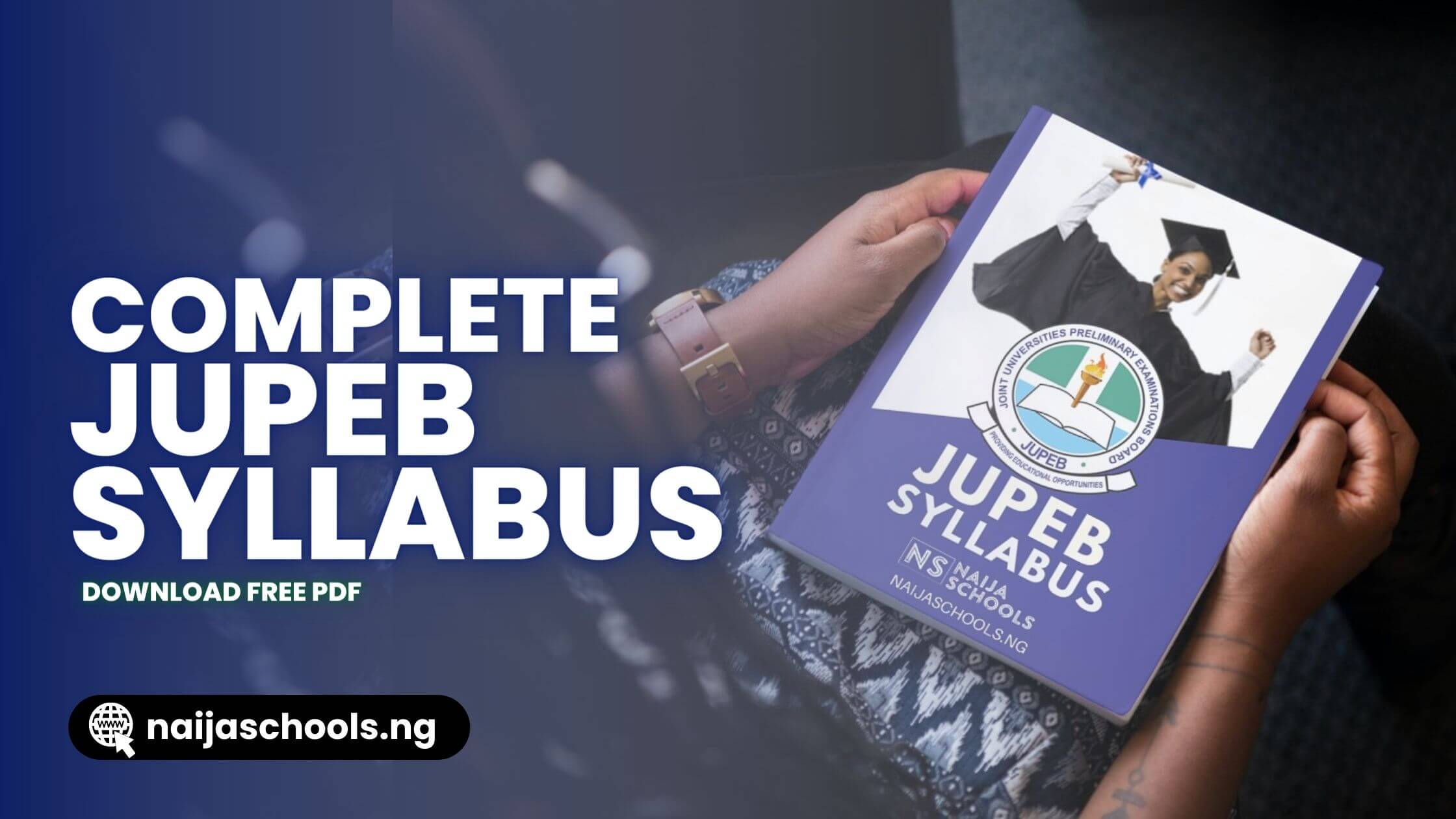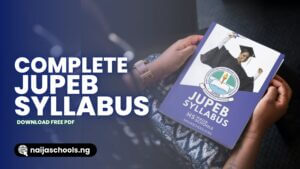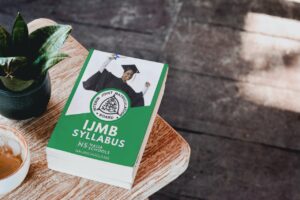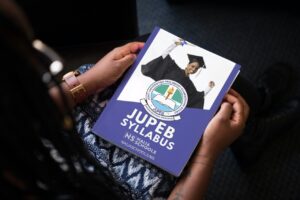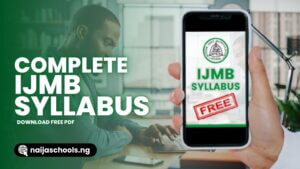Objectives of Literature in English JUPEB Syllabus
At the end of this course, the candidate should be able to:
i. Identify the features of Drama, Prose Fiction and Poetry
ii. Demonstrate the relevance of Drama, Prose Fiction and Poetry to the individual and society;
iii. Analyse dramatic and prose texts and Poems of African and non-African origins;
iv. evaluate extant dramatic, prose fiction and poetic traditions all over worldwide.
Courses:
The Literature JUPEB Syllabus is divided into four (4) course units which will be treated during the JUPEB program.
COURSES FOR FIRST SEMESTER:
- LIT 001: INTRODUCTION TO DRAMA: 3 Units
- LIT 002: PROSE FICTION 3 units
COURSES FOR SECOND SEMESTER SYLLABUS:
- LIT 003: INTRODUCTION TO POETRY 3 units
- LIT 004: UNSEEN PROSE AND POETRY 3 Units
Detailed Syllabus
LIT 001: INTRODUCTION TO DRAMA: 3 Units
- Definition of drama/theatre
- Origin of drama/theatre
- Types/Forms of drama: Tragedy, Comedy, Melodrama, Farce etc.
- The Structure of drama: Plot (conflict, resolution and meaning), Character, Language, Themes etc.
- The relevance of drama to the society
THE CLASSICAL TRADITION
- Introduction to Classical Tradition in Drama
- Major playwrights and theorists of the classical tradition: Sophocles, Aeschylus, Euripides, Aristophanes, Aristotle etc.
- [Sophocles’ King Oedipus and Antigone are recommended texts to be used in illustrating background to, aspects and tradition of Classical drama and theatre
EUROPEAN DRAMA (THE RENAISSANCE TRADITION)
Background to Renaissance Drama: William Shakespeare, Christopher Marlowe, etc.
WILLIAM SHAKESPEARE: Shakespeare’s England, Drama in the Elizabethan and Jacobean Ages, Shakespeare’s Contemporaries
TEXUAL STUDIES: Macbeth, Twelfth Night, Hamlet, Merchant of Venice. It is expected that candidates should do an in-depth study of at least one tragedy and one comedy. In doing this, attention should be paid to the structure and elements of drama. A very detailed study is recommended.
EUROPEAN DRAMA (THE MODERN TRADITION)
Background to Modern Drama: Henrik Ibsen, George Bernard Shaw, John Osborne, Anton Chekhov, Betolt Bretch, Samuel Becket etc.
Henrik Ibsen and George Bernard Shaw: Drama in the Modern Period, Ibsen, Shaw and the Modern Society.
TEXTUAL STUDIES: An in-depth textual analysis of G. B. Shaw’s Mra Warren’s Profession or Henrik Ibsen’s Hedda Gabler
AMERICAN DRAMA (THE MODERN TRADITION)
- Background to American Drama: Arthur Miller, Tennessee Williams, August Wilson, Amiri Baraka, etc.
- August Wilson and Amiri Baraka: Drama in the Modern American Society.
TEXTUAL STUDIES: An in-depth textual analysis of Wilson’s Fences or Baraka’s Dutchman.
AFRICAN DRAMA (THE MODERN TRADITION)
- Background to African Drama: Wole Soyinka, J. P. Clark-Bekederemo, Zulu Sofola, Tess Onwueme, Femi Osofisan, etc..
- Wole Soyinka and Ama Ata Aidoo: Drama in the Modern African Society.
TEXTUAL STUDIES: An in-depth textual analysis of Soyuinka’s Death and the King’s Horseman or Aidoo’s Dilemma of a Ghost.
LIT 002: PROSE FICTION 3 units
- Definition of Prose Fiction
- Development of the Novel Tradition/Modern Prose Fiction
- Types/Forms of Prose Fiction: African, non-African, Short story, Novella, Novel, etc.
- The Structure of Prose: Plot (conflict, resolution and meaning), Character, Language, Themes, Setting etc.
- The relevance of Prose to the society
THE EUROPEAN PROSE TRADITION
- Introduction to European Prose Tradition
- Major prose writers of the European prose tradition: Daniel Defoe, Henry Fielding, George Eliot, Jane Austen, James Joyce, etc
- [Jane Austen’s Pride and Prejudice and E. M. Forster’s A Passage to India are recommended texts to be used in illustrating background to, aspects and tradition of European Prose tradition].
AFRICAN PROSE (MODERN AFRICAN NOVEL)
- Background to Modern African novel: Chinua Achebe, Wole Soyinka, Elechi Amadi, Ngugi wa Thiong’O, Ayi Kwei Armah, Sembene Ousmane, etc.
- Chinua Achebe’s A Man of the People and wa Thiong’ O’s A Grain of Wheat
TEXTUAL STUDIES: Thematic preoccupation, setting, characters and characterization, plot structure, etc of the two novels to be analysed
LIT 003 INTRODUCTION TO POETRY 3 units
- Definition of Poetry and the poem
- Traditional and Modern Poetry (Oral and Written).
- Types/Forms of Poetry: Lyric, Ode, Ballad, Dirge, Epic, Sonnet, The Free Verse
and Blank Verse etc.- The Structure of the Poem: Versification and Stanza Forms, Cantos; Plot (conflict, resolution and meaning), Character, Language, Themes etc.
- The relevance of Poetry to the society
THE CLASSICAL TRADITION
(a). Introduction to Classical tradition in Poetry
(b). Major poets and theorists of the classical tradition: Homer, Ovid, Plato Aeneas etc.
[Ovid’s Metamorphoses I-V is the recommended text to be used in illustrating background to, aspects and tradition of Classical poetry].
EUROPEAN POETRY (THE MEDIEVAL AND RENAISSANCE TRADITIONS)
- Background to Medieval and Renaissance Poetry: Geoffrey Chaucer, Sir Thomas Wyatt, Surrey, Edmund Spencer, Sir Walter Raleigh, John Milton, William Shakespeare, John Donne etc.
- The rise of English Language from vernacular status to acceptable international level should be studied. Chaucer’s, Wyatt’s, Shakespeare’s, Pope’s contributions as well as the general conditions of poetry in the Medieval, Elizabethan, Jacobean, Caroline, Restoration and Augustan Ages should be studied.
TEXUAL STUDIES: Geoffrey Chaucer: General Prologue, Wife of Bath’s Tale; John Milton: Paradise Lost Bks 1 & 2; Alexander Pope: The Rape of the Lock; John Donne: “Holy Sonnet;” Andrew Marvell: “To His Coy Mistress.” George Herbert: “The Collar:” It is expected that candidates should do an in-depth study of at least three major poets. In doing this, attention should be paid to the structure and elements of Poetry. A very detailed study is recommended.
EUROPEAN POETRY (19th. and 20th. CENTURIES)
- Background to The Romantic, Victorian Edwardian and Modern Poetry: William Worthsworth’s Preface to The Lyrical Ballads should serve as a good introduction to The Romantic and Later traditions.
- William Worthsworth’s “Resolution and Independence;” John Keats’ “The Eve of St. Agness;” Thomas Hardy’s “The Ruined Maid” and “A Church Romance;” T. S. Eliot’s “The Waste Land;” W. B. Yeats’ “The Second Coming Shaw and the Modern Society are expected to be studied comprehensively
AMERICAN POETRY (THE MODERN TRADITION)
Background to AFRICAN Poetry: Oral and Written; Interface between the Oral and the Written forms. Anonymity and Authorship; Examples of modern authors: Wole Soyinka, Christopher Okigbo, Kofi Awoonor, Dennis Brutus, Masizi Kunene etc.
TEXTUAL STUDIES: An in-depth textual analyses of Soyinka’s “The Four Archetypes” Christopher Okigbo’s “Path of Thunder” Kofi Awoonor’s “Songs of Sorrow” Masizi Kunene’s Emperor Shaka The Great and Okot p’Bitek’s Song of Lawino are recommended
LIT 004 UNSEEN PROSE AND POETRY 3 Units
LITERARY APPRECIATION (UNSEEN)
Students will be tested on specific skills of literary appreciation and criticism of the main genres (drama, poetry and prose fiction). It is recommended that the candidates be taught, in addition, critical approaches like, Biographical, Philosophical, Textual, Structural etc. while the specific techniques of criticism are recommended, no specific texts are specified.
Download the Literature in English JUPEB Syllabus (PDF)
Click on the “Download” button to download the JUPEB syllabus for Literature in English in PDF format.
Recommended Articles
- JUPEB Syllabus For All Subjects — Free PDF Download
- CRS JUPEB Syllabus — Free PDF Download
- French JUPEB Syllabus — Free PDF Download
- History JUPEB Syllabus — Free PDF Download
- Igbo JUPEB Syllabus — Free PDF Download
- Islamic Studies JUPEB Syllabus — Free PDF Download
- Literature in English JUPEB Syllabus — Free PDF Download
- Music JUPEB Syllabus — Free PDF Download
- Visual Arts JUPEB Syllabus — Free PDF Download
- Yoruba JUPEB Syllabus — Free PDF Download
- IJMB Syllabus For All Subjects — Free PDF Download

